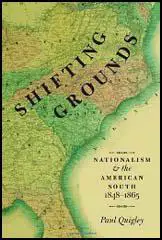Spartacus Review
Volume 56: 28th December, 2011
American Civil War

Title: Shifting Grounds
Author: Paul Quigley
Editor:
Publisher: Oxford University Press
Price: £22.50
Bookshop: Amazon
Spartacus Website: American Civil War
Category:
Between 1848 and 1865 white southerners felt the grounds of nationhood shift beneath their feet. The regional conflict over slavery that culminated in the American Civil War forced them to confront difficult problems of nationalism. What made a nation a nation? Could an individual or a group change nationality at will? What were the rights and responsibilities of national citizenship? Why should nations exist at all? As they contemplated these questions, white southerners drew on their long experience as American nationalists and their knowledge of nationalism in the wider world. Shifting Grounds tells the fascinating story not just of the radical secessionists who shattered the Union in 1861, but also of the moderate majority who struggled before and after secession to balance their southern and American identities and loyalties. As they pondered the changing significance of the Fourth of July, as they fused ideals of masculinity and femininity with national identity, they revealed the shifting meanings of nationalism and citizenship. Southerners also looked across the Atlantic, comparing southern separatism with movements in Hungary and Ireland, and applying the European model of romantic nationalism first to the United States and later to the Confederacy. Evaluating the American South in transnational context sheds new light on the ideas and motivations behind America's greatest conflict. The creation of the Confederacy and the onset of brutal war in 1861 both built on and transformed antebellum ideas. A powerful national government imposed newly stringent obligations of citizenship while the shared experience of suffering united many Confederates in a sacred national community of sacrifice. For all white southerners-Unionists, die-hard Confederates, and the large majority torn between the two-the problems of nationalism had come to matter more by 1865 than ever before.
